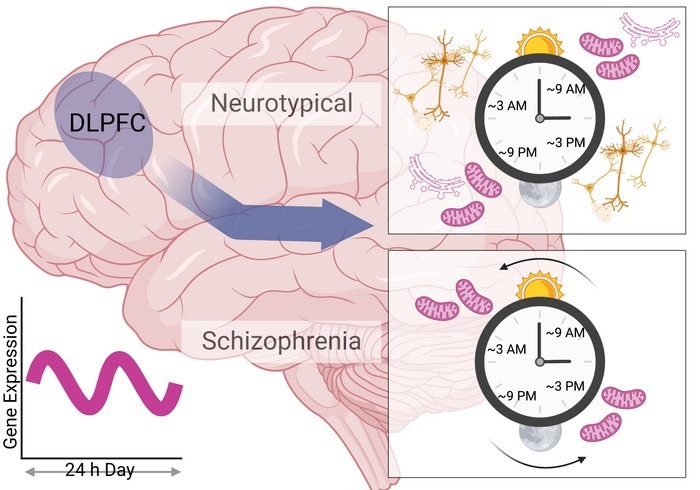The first proof of 12-hour cycles of gene activity in the human brain is presented by researchers at the University of Pittsburgh School of Medicine in the United States.
 12-hour rhythms in the human dorsolateral prefrontal cortex (DLPFC) are abnormal in schizophrenia. Created with biorender.com. Image Credit: Colleen A. McClung (CC-BY 4.0, https://creativecommons.org/licenses/by/4.0/)
12-hour rhythms in the human dorsolateral prefrontal cortex (DLPFC) are abnormal in schizophrenia. Created with biorender.com. Image Credit: Colleen A. McClung (CC-BY 4.0, https://creativecommons.org/licenses/by/4.0/)
The study conducted by Madeline R. Scott, which was published on January 24th, 2023, in the open-access journal PLOS Biology, also shows that some of those 12-hour rhythms are absent or modified in the postmortem brains of schizophrenia patients.
Numerous 24-hour biological rhythms, including sleep/wake cycles, hormone levels, and gene activity in the prefrontal cortex of the brain, are known to be disturbed in schizophrenia patients. However, nothing is known about gene activity in the brain for cycles that are shorter than the typical 24-hour circadian rhythm, whether it is healthy or not.
The current study employed a time-of-death analysis to hunt for 12-hour cycles in gene activity inside postmortem brains since gene transcript levels cannot be detected in living brains.
They concentrated on the dorsolateral prefrontal cortex since schizophrenia has been linked to anomalies in gene expression rhythms and cognitive symptoms in this part of the brain.
The majority of the genes with 12-hour cycles in activity were discovered in the typical dorsolateral prefrontal cortex. Among these, gene activity levels associated with creating connections between neurons peaked in the late afternoon or early evening, whereas those associated with mitochondrial function (and consequently cellular energy supply) peaked in the early morning or late evening.
Postmortem brains from schizophrenia patients, on the other hand, had no genes associated with neural connections and fewer genes with 12-hour activity cycles. Furthermore, although having a 12-hour rhythm, the mitochondria-related genes’ activity did not peak at the expected periods.
Future research should investigate whether these abnormal rhythms are the cause of the behavioral anomalies in schizophrenia or if they are the consequence of drugs, nicotine use, or sleep disorders.
We find that the human brain has not only circadian (24 hour) rhythms in gene expression but also 12-hour rhythms in a number of genes that are important for cellular function and neuronal maintenance.”
Colleen A. McClung PhD, Study Co-Author and Professor, Department of Psychiatry, University of Pittsburgh School of Medicine
McClung added, “Many of these gene expression rhythms are lost in people with schizophrenia, and there is a dramatic shift in the timing of rhythms in mitochondrial-related transcripts which could lead to suboptimal mitochondrial function at the times of day when cellular energy is needed the most.”
Source:
Journal reference:
Scott, M. R., et al. (2023). Twelve-hour rhythms in transcript expression within the human dorsolateral prefrontal cortex are altered in schizophrenia. PLOS Biology. doi.org/10.1371/journal.pbio.3001688